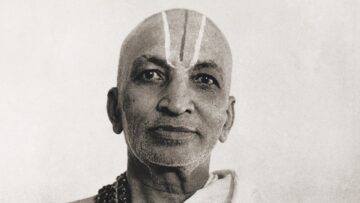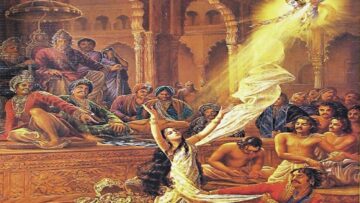As the year 2020 draws to a close, everyone has been jolted (big or small) thanks to the pandemic. Covid-19 has made sure that we do not forget the deadly consequences of our habitual destructive actions.
But how many of us have taken the challenge to our habitual patterns of feeling, thinking, and acting to examine ourselves deeply? The meaning and urgency for spiritual life and journey have never hit humanity harder. But will we pause and learn?
Raghu: I have been sitting with the difficulty of being a Hindu for quite some time especially in the current context. In Indian thought, there is yuga dharma i.e. a collective idea of a way of living, the Kali-yuga that is a current one has its own characteristics.
Discovering a spiritual path while owning up to and transcending one’s anchors of belonging and the conditioning impact of one’s education is a daunting task. But before I go further I want to understand what comes to your mind when I say the following words-:
Monotheistic thinking
GI: There is only one way of living, one God and if someone is different, has a different value system or God then it is impossible to co-exist.
SR: I also feel that it is a one-way approach to things and only my thinking is correct
HV: My way or the highway.
Raghu: Ok, what about individualism?
AC: It is about how can I gain at every cost?
GI: It is a glorified concept of just thinking about me
HV: I exist as separate atomized being and I have a separate existence. I have to act for myself first and then think about the rest etc.
Raghu: Utilitarianism?
SR: I feel I am using everything around me and surely not consciously.
HV: If there is no meaning or use, there is no utility
Raghu: Ok. What about empiricism?
HV: I see you, therefore I believe
AC: Prediction and control.
GI: Anything that is measurable is important to me.
Raghu: Now, tell me what does a spiritual quest mean to you?
GI: Self-discovery
AC: Feeling of oneness and connectedness with everything on earth
SR: To be able to deeply listen to the context around me and myself. Thus, finding a dharmic location for myself.
Raghu: The four words I asked you to reflect on upon-monotheism, individualism, utilitarianism, and empiricism are describing the current external context, the current yuga dharma! How will you pursue a spiritual quest in the context of the aforementioned four words?
AC: I see a separation in people from themselves, each other, nature etc. and a spiritual quest would help heal these divides and bring harmony.
GI: I feel it is all the more necessary to be on a spiritual quest because so far we have extracted, used, separated and now we see the results of our ways through the likes of Covid virus, climate change, etc. It is not easy but it must be done.
SR: I see these four words play out in my everyday life so clearly; thanks to the spiritual quest I am at least aware about these aspects. I am not saying that all my decisions are perfect but at least I am trying.
Raghu: So, the quest is constant questioning of yourself and the current pulls of the system?
AC: Yes.
HV: I guess these questions will arise when you are on a spiritual quest. A spiritual quest is like a homecoming for me. I see it as a channel for healing others and myself in this process. But I also understand helplessness when I see the context around me, so there is only that much that I can do.
GI: The journey is quite lonely so I feel the need for a sanghA or ashram to help each other. It is difficult to do it alone.
Raghu: Then shall we all move to the Himalayas to pursue this path?
SR: I asked myself this question many times, but then there is no context for a spiritual quest, it then becomes a personal quest.
HV: It will be scary to renounce and go away, because there is nothing to indicate or help me understand where I am? I see the struggle and many tugs and pulls in this context. But if I withdraw I can trick myself into believing that ‘I am very spiritual’. I could be living a fantasy.
GI: If I go there, I feel I have already made it and would not bother to work anymore.
AC: I have read books on certain spiritual traditions etc. and I am curious about the below three questions-:
1. What is the nature of reality?
2. How does the world function?
3. What does growth and well being mean at a personal level?
The inquiry into these questions can only happen if I am completely present to the context and myself.
Raghu: What would indicate that you have made a movement in your quest?
AC: There are a few parameters, which help me understand my journey.
1. There is a deep contentment when I practice abhyAsa and vAiragya through the day to fulfill my sankalpAs and intentions. This abhyAsa continues throughout the day and is right in the context rather than away from it. When all of it happens there is a santosha that emerges that I am living a dharmic life. It is the best version of me I can be right now.
2. How do I fare with respect to my sankalpAs through the days and weeks?
3. A realization of having grown
Raghu: So, your practice is not to escape from the context?
AC: It is for the context. Having done that, there is an ease and santushti that emerges for me. I feel I have done my best at every given moment of time in this context, and that I have acted in a way that is loka hita or has loka sangraha.
Raghu: So one of the anchors of the spiritual quest is to understand that the context is not outside of me and that I am part of the context. I also feel that the context we are experiencing today is very fragmenting. The monotheistic, utilitarian views we discussed above can be very violent in its expression. Thus, an attempt to discover some measure of wholesomeness is also part of the spiritual quest. It does not mean I am running away to find dharma and wholesomeness, rather it is in the midst of these pulls and pushes that I find something in me that feels integrated?
HV: I would like to add that how can I establish a wholesomeness and integration in my action every day? So, if I take these steps would I not be on the path?
Raghu: The path is not clearly defined but yes, if I keep meeting life’s challenges with a holistic and dharmic search then I can say that I am on the quest.
AC: The journey is the goal?
Raghu: I am not talking about a goal at all. The inner commitment to respond to each of these challenges with wholesomeness is what I am talking about.
GI: What does this wholesomeness and integration mean?
Raghu: Being aware of where I am responding from? How I am interpreting the context? What feelings I am generating in me when deal with challenges? How am I deploying my belonging? Am I reinforcing my identity or am I growing and expanding? How am I dealing with the past and the future? How do I define success, is it personal aggrandizement?
SR: I feel that I constantly seek the context to fill my voids and asmitA. If this context is not there then I am almost naked and vulnerable.
Raghu: If you resist the need to fill up the space, isn’t that a first step in the direction of a spiritual quest?
SR: True.
Raghu: If you commit to being self-reflective and anchored in some of the questions I posed, you will not be engaging with the context in an extractive or defensive way, rather you will respond from a different space. Of course, it may happen that you are not aware about that space which is fine. But just realizing the pull of the other and responding to the world in a way that does not pull you back into your extractive and self-centered ways is the key.
AC: I used to feel a heavy burden when I could not act in ways that are dharmic and enlivening for the context. But now, understanding what does a spiritual quest mean helps me how to look at my actions. It feels like a prAyascittam.
Raghu: If you start with the premise that “no matter what I must change the context” then you will fail. But if you can keep the “change the context” part as a consequence, which may or may not happen, and focus on the action, being aware of one’s own motivations, and so on, then neither guilt nor shame will arise. Every context will be a gift for your self-discovery.
AC: And what if I do slip?
Raghu: You just learn and start again.
AC: I feel I keep coming back to this starting point again and again.
Raghu: Learning is not just a momentary thing, you may have to disengage and reflect, observe your inner processes as deeply as you can, learn about yourself, and start again.
GI: Does confronting a challenge mean you keep looking for things in the world or yourself to fix?
Raghu: No, confronting a challenge that comes to me does not necessarily mean fixing it. In the spiritual journey, I am focusing on a holistic and integrated nature of my response. I cannot be sure whether the challenge or context gets fixed. I don’t go seeking challenges or problems to fix. I am not a social activist.
AC: Does the action come first or do we first look at our practice of sensitivity and sincerity before we act? It feels as though it is a chicken and egg story.
Raghu: This is part of the sAdhana, there is no starting or ending per se.
SR: So I move from a kurukshetram to a dharma kshetram?
Raghu: Yes, absolutely, but only when you commit to deep and honest self-discovery.
SR: Where do we start in this yuga dharma?
Raghu: The way most of us define our world, our idea of success, our ways of looking at ourselves, our belonging, and others all of these are the outcome of the yuga dharma. The four terms we used, in the beginning, sums up today’s world: extractive, you vs me, and so violent. Clearly, this is continuing because we are not questioning it. This is what you are born into and are currently facing. This context impacts you and conditions you. But at some point of time you realize that you have a choice- A choice to continue reinforcing the world you have inherited or acting in ways that does not reinforce the old ways. You can choose to build a world with equity, mutual respect, respect for the earth, and respect for many truths i.e., a world where you, your context, and the whole earth can flourish.
If this is not a spiritual quest then I am not sure what is?
Featured Image Credits: Sanskargroup
Disclaimer: The opinions expressed in this article belong to the author. Indic Today is neither responsible nor liable for the accuracy, completeness, suitability, or validity of any information in the article.










